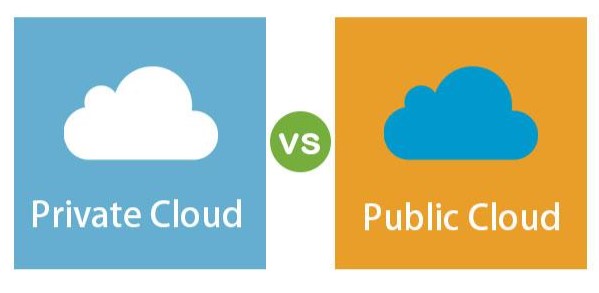A user can access data stored in a remote place at any time on any device using the internet and cloud storage, a computer service paradigm. As we see more and more businesses use the cloud, they each have their unique set of wants and requirements. The cloud is often separated into Public Cloud vs Private Cloud, depending on these demands. First, we must first get into what Public Cloud vs Private Cloud are and what they offer in order to understand their differences and similarities.
What is Public Cloud?
In Public Cloud vs Private Cloud, the public cloud refers to the hosting of data on a public data center, made available to the general public by cloud service providers. This implies that each user works independently while still sharing the same database, similar to how different people can withdraw money from the same bank but only from their own accounts.
Advantages:
- Drastically lowers the primary cost.
- Easier to install
- Easy scaling

Drawbacks:
In Public Cloud vs Private Cloud, a public cloud is less secure than a private cloud since anyone can access it. A private cloud is a preferable choice if your company manages sensitive data and demands complete extreme privacy, such as in the government or health sectors.
What is Private Cloud?
In Public Cloud vs Private Cloud, Private cloud storage describes the hosting of data in a data center using either your own or another party's infrastructure, but particularly for you. Data is shared through a private network and is managed by a single company's private cloud.
Advantage:
- Better reliability
- In general, security is very high.
- High performance is ensured by using dedicated servers.
Drawbacks:
In Public Cloud vs Private Cloud, since you have so much control over a private cloud, you are in charge of every aspect of the operation. The upfront fees and upkeep of a private cloud may be too much for your business if you don't have an internal DevOps team or the funding to hire and train one.
Similarities between Public Cloud vs Private Cloud
The similarities between Public Cloud vs Private Cloud are as follows:
Virtualization
Virtualization technologies are used to build virtual machines in both the Public Cloud vs Private Cloud, allowing them to make the best use of physical hardware and resources.
Automation
Automation solutions are used to manage and provision resources in both the Public Cloud vs Private Cloud, which helps to streamline operations and improve efficiency.
High Availability
Both the Public Cloud vs Private Cloud is built to ensure high availability and reliability, with several data centers, redundant systems, and failover procedures to reduce downtime.
Scalability
Both the Public Cloud vs Private Cloud is designed to be scalable, allowing users to simply add and remove resources as needed to meet changing demands.
Resource Pooling
Both the Public Cloud vs Private Cloud use resource pooling, which allows several users or applications to share resources such as storage, networking, and computing power.
Service-oriented Architecture
Both the Public Cloud vs Private Cloud employs a service-oriented architecture (SOA), in which resources are delivered as services that may be accessed and used by numerous applications or users.
Differences between Public Cloud vs Private Cloud
A cloud service is dedicated to one company. The private cloud user is the only one using it. In Public Cloud vs Private Cloud, a public cloud is a cloud service that distributes computer resources among several users, even while the data and apps that each user uses in the cloud-based system are kept private from other users.
In Public Cloud vs Private Cloud, a public cloud is like renting a comparable-sized house, but a public cloud is like renting an apartment. Although the house is more private, renting one often costs more, and doing so does not make the best use of resources. The building manager manages flat maintenance, but hiring a professional to fix the residence is more difficult. (often, the renter may have to do it themselves).
There are two types of private clouds: hosted private clouds, which are provided by a third-party cloud provider, and internal private clouds, which are controlled and maintained internally by an organization.
Conclusion - Public Cloud vs Private Cloud - How does Xcitium Cybersecurity help organizations?
In Public Cloud vs Private Cloud, Public Clouds are where your data is saved over public data centers that are on the infrastructure of your Cloud Service Provider, whereas Public Cloud vs Private Cloud, where your data is stored over private data centers that are sectioned off, particularly for you, which may or may not be on your infrastructure. The technology that combines both to provide the best results possible is called a hybrid cloud.
To assist you in making the best cloud security options for your business and workload, Xcitium Cybersecurity is available. We are here to make sure that your data and apps are secure. Visit for more information.